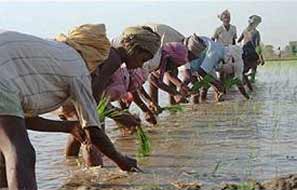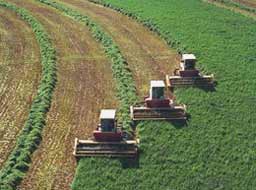Robert Reich
World Food Day, which is today, seems an appropriate occasion to consider both where our food comes from and also who’s hungry in the world. The two topics are connected. Poor nations need to export food to the USA and other rich nations, if they’re to have half a chance of alleviating poverty there. But rich nations are making it difficult for them to do so.

Poor nations don’t have much industry, but they do have farms. The corn, wheat, cotton, sugar, rice, and dairy products they produce are just about the only things many of them have to trade for what they need from the rest of the world.
Poor nations can produce a lot of these staples cheaper than rich nations, so you might think there’s a natural fit. Think again, because rich nations have farmers, too. Not many of them, mind you, but they’re politically powerful. Fewer than 3 percent of Americans work directly on farms, but agribusiness is big business in the USA. It’s the same in Europe and Japan.
Rich countries spend hundreds of billions a year subsidizing their farmers, making it almost impossible for poor nations to compete. Japan gives rice farmers seven times what it costs them to produce rice, which allows farmers to sell the rice for very little, shutting out cheap rice produced in Thailand and other developing nations. By blocking access to the market, rich nations end up depriving poor nations of an opportunity to improve their living standards.

One of the biggest culprits is the USA. Last year the Bush administration announced it would give American farmers an extra $175 billion during the next decade. It said it was acting to defend farmers against artificially cheap produce from Europe.
This is crazy, folks. These subsidies cost Americans twice over. They pay more for the food they eat, and they pay more taxes to make these farm payments. Meanwhile, poor nations get clobbered. How are they going to earn the money they need to develop their economies if they can’t sell their farm produce?
The USA talks a good game about foreign aid. Baloney. The yearly subsidy it gives just to American cotton farmers is three times its total aid to Africa. From 2001 to 2002, the USA granted its cotton farmers $3 billion in subsidies - more than the entire economic output of Burkina Faso, just one poor West African nation.
Poor nations don’t need foreign aid. They need a fair shot at markets in rich nations. While the most recent round of World Trade Organization talks collapsed, rest assured, farmers in rich countries won’t give up without a fight, but poor nations have almost nothing to fight with. We in rich nations should be ashamed.
On World Food Day we should try to remind ourselves that poor nations need to export their food. By preventing them from doing so, our farm subsidies are keeping poor nations poor.
Robert Reich was Secretary of Labour under the Clinton administration and is the Maurice B. Hexter Professor of Social and Economic Policy at Brandeis University.